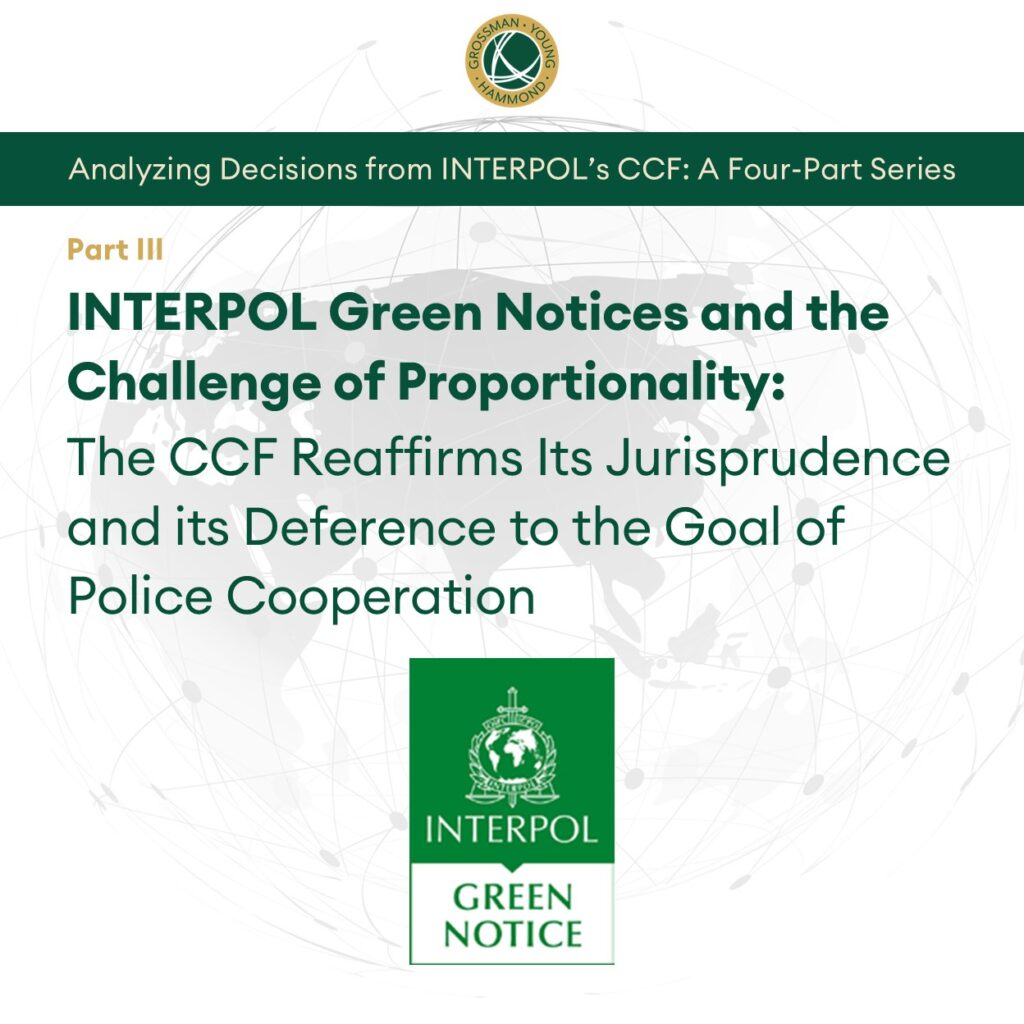INTERPOL Green Notices and the Challenge of Proportionality: The CCF Reaffirms Its Jurisprudence and its Deference to the Goal of Police Cooperation
This article is the third in a four-part series analyzing the latest 2025 decisions from the Commission for the Control of INTERPOL’s Files (CCF). In this installment, we examine the CCF’s approach to Green Notices, focusing on the conditions for their publication and the challenges of contesting them.

By, Charlie Magri, Of Counsel & Sandra Grossman, Managing Partner
The CCF has issued a new decision reaffirming its approach to Green Notices, underscoring the challenges associated with contesting these alerts. Unlike Red Notices, which require a relatively higher threshold of legal and procedural safeguards, Green Notices serve as a warning mechanism, alerting law enforcement agencies to individuals who may pose a potential threat to public safety. This latest decision highlights the CCF’s strict interpretation of the criteria for Green Notices, the difficulty of challenging them on proportionality grounds, and the continued requirement that NCBs (the INTERPOL National Central Bureaus in each member country) demonstrate compliance with domestic legal standards.
The Distinct Legal Nature of Green Notices
Green Notices, as defined under Article 89 of INTERPOL’s Rules on the Processing of Data (RPD), may be issued to warn member countries about individuals who may pose a threat to public safety or who may commit an offense in another jurisdiction. Unlike Red Notices, which function as international lookouts for individuals wanted for prosecution or to serve a sentence, Green Notices are preventive in nature and rely largely on an assessment by national authorities based on an individual’s past criminal record.
The case at hand concerns an applicant who was the subject of multiple convictions in his home country, including for drug-related offenses, theft, and intellectual property violations. The National Central Bureau (NCB) of the issuing country justified the Green Notice on the basis that the applicant was considered a public safety risk. The applicant, in turn, argued that the data lacked purpose, as he had not committed any offenses since 2015 and was a law-abiding person. He further claimed that the Green Notice had a disproportionate impact on his rights, particularly his ability to travel freely.
The CCF rejected both arguments, concluding that the Green Notice remained relevant and proportionate. The Commission found that the applicant’s multiple prior convictions and subsequent detention in another INTERPOL member country provided a sufficient basis for the alert. While acknowledging the principle that INTERPOL data must not be excessive in relation to their purpose, the Commission determined that the public safety concerns raised by the NCB outweighed any alleged restrictions on the applicant’s rights.
Proportionality and the Limits of Challenging Green Notices
A key takeaway from this decision is the CCF’s strict interpretation of proportionality in the context of Green Notices. The applicant contended that the Notice had an unjustified impact on his fundamental rights, particularly given that his last conviction dated back nearly a decade. However, the CCF placed greater weight on the NCB’s assessment that the applicant continued to pose a risk based on his criminal history.
The Commission stated that while INTERPOL’s rules require data to be proportionate to their purpose, proportionality must be assessed in light of the objectives of international police cooperation. The Green Notice, in this case, was issued to warn other member countries about an individual with a documented history of repeat offenses. The CCF noted that the NCB had demonstrated the relevance of the Notice and that it had been issued after the applicant’s detention in another jurisdiction, reinforcing its continued utility.
Legal Safeguards: The Requirement of Domestic Compliance
While the CCF upheld the validity of the Green Notice, it recalled an important safeguard: it required the NCB to confirm that the retention of the data was authorized under the country’s domestic legal framework. Under Article 11 of the RPD, all data processed through INTERPOL’s channels must be in compliance with the national laws of the issuing country. In this case, the NCB had not explicitly confirmed that the retention of the Green Notice continued to be lawful under its legal framework.
The Commission ruled that if the NCB failed to provide such confirmation within one month, the data would be deemed non-compliant and deleted.
Implications for Practitioners
This decision underscores the challenges associated with contesting Green Notices which are based on law enforcement assessments of potential threats, making them inherently more difficult to challenge. The ruling provides several key takeaways for legal practitioners:
- Proportionality claims require strong evidence. General arguments about the passage of time or the impact of the Notice on fundamental rights may be insufficient if the individual has a history of repeat offenses, no matter how long ago those offenses took place. Unless the NCB’s assessment can be demonstrated as extremely outdated or arbitrary, proportionality challenges are unlikely to succeed.
- The burden remains on NCBs to justify ongoing retention. While the CCF upheld the Notice, it required confirmation of compliance with national law. This highlights a potential avenue for challenges—if an NCB cannot demonstrate that a Green Notice remains legally justified under domestic law, it may be subject to deletion.
By reaffirming its jurisprudence, the CCF has reinforced the principle that Green Notices serve an important function in international police cooperation. However, the decision also highlights the limits of proportionality arguments, and the evidentiary burden required to successfully challenge such alerts.
Practitioners representing clients subject to Green Notices should be prepared to present strong factual and legal arguments that directly address both the purpose of the Notice and its ongoing compliance with domestic and international legal standards.

